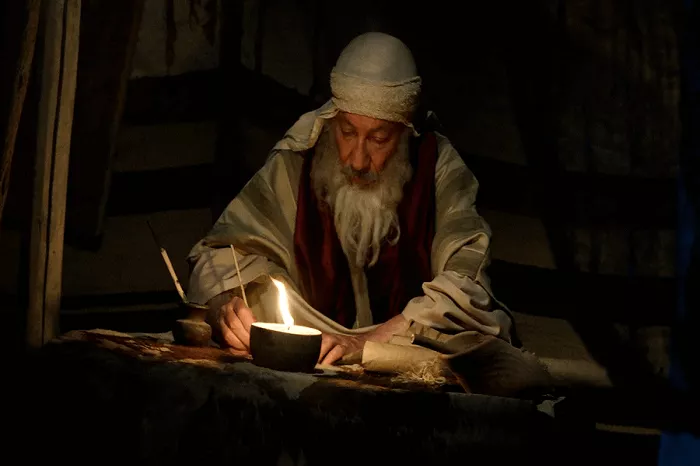The authorship of the Book of Genesis is a topic of much discussion. Traditionally, Moses is credited with writing Genesis. This belief is held by many Jews and Christians. Understanding why Moses is considered the author involves looking at biblical references, historical evidence, and scholarly analysis.
Biblical References
The Bible itself provides some clues about the authorship of Genesis. Several passages suggest that Moses wrote the first five books of the Bible, known as the Pentateuch. These books are Genesis, Exodus, Leviticus, Numbers, and Deuteronomy.
Jesus’ Testimony
In the New Testament, Jesus refers to the writings of Moses. For example, in John 5:46-47, Jesus says, “If you believed Moses, you would believe me, for he wrote about me. But since you do not believe what he wrote, how are you going to believe what I say?” This implies that Jesus acknowledged Moses as the author of the Pentateuch.
References in the Old Testament
The Old Testament also supports Moses’ authorship. In several places, the text mentions Moses writing down God‘s laws and instructions. For instance, Exodus 24:4 says, “Moses then wrote down everything the LORD had said.” While this specifically refers to the law, it supports the tradition that Moses recorded significant parts of the Pentateuch.
Jewish Tradition
Jewish tradition strongly holds that Moses wrote Genesis. The Talmud, a central text of Rabbinic Judaism, attributes the Pentateuch to Moses. This tradition has been passed down through generations. It forms a significant part of Jewish belief about the origins of their sacred texts.
Historical Context
Moses lived during a period when writing was well-established. Ancient Egypt, where Moses was raised, had a rich tradition of writing and record-keeping. Moses would have been familiar with these practices. This historical context supports the idea that Moses could have written Genesis.
Scholarly Support
Many scholars support the traditional view of Mosaic authorship. They point to the consistency of style and content across the Pentateuch. This suggests a single author or a closely connected group of authors. While there are differing opinions, a significant number of scholars see Moses’ hand in these texts.
The Documentary Hypothesis
The Documentary Hypothesis is a modern scholarly theory. It suggests that the Pentateuch is composed of multiple sources. These sources were combined over time. This hypothesis challenges the traditional view of Mosaic authorship. However, it also acknowledges the possibility that Moses contributed to these texts.
Internal Evidence in Genesis
There is internal evidence in Genesis that points to Mosaic authorship. For example, the detailed accounts of the patriarchs’ lives reflect an intimate knowledge of their history and culture. Moses, as an Israelite leader, would have had access to this knowledge. He could have compiled and recorded these traditions.
Moses’ Education and Background
Moses was educated in the royal court of Egypt. This education included reading, writing, and administrative skills. His background equipped him with the ability to write complex texts. The Book of Genesis, with its detailed genealogies and narratives, reflects this level of education.
The Role of Oral Tradition
Oral tradition played a significant role in preserving history before it was written down. Moses could have relied on these oral traditions. He then compiled them into a written form. This process would have helped preserve the accuracy and continuity of the stories in Genesis.
Support from Archaeology
Archaeological findings have supported aspects of the Genesis narrative. Discoveries related to ancient Near Eastern cultures and customs align with the details in Genesis. These findings suggest that the author had a deep understanding of the historical and cultural context, which Moses would have had.
See Also: Giants in the Book of Genesis: All You Need to Know
The Importance of Moses’ Leadership
Moses was a central figure in the history of Israel. His leadership during the Exodus and the journey to the Promised Land is well-documented. Writing Genesis would have been a part of his role in establishing Israel’s national identity and preserving their history.
Continuity with the Rest of the Pentateuch
Genesis is closely connected with the other books of the Pentateuch. Themes, laws, and narratives flow seamlessly between them. This continuity supports the idea of a single author or a cohesive group of authors. Moses, as a central figure in these events, fits this role well.
Theological Implications
Believing that Moses wrote Genesis has theological implications. It underscores the divine inspiration of the text. Moses was chosen by God to lead His people and record His laws. This belief reinforces the authority and sacredness of Genesis as part of the Bible.
Conclusion
The belief that Moses wrote Genesis is supported by biblical references, Jewish tradition, historical context, and scholarly analysis. While modern theories like the Documentary Hypothesis offer different perspectives, the traditional view remains strong. Moses’ background, education, and role as a leader make him a credible author of Genesis. Understanding the evidence for Mosaic authorship helps appreciate the depth and significance of this foundational book in the Bible.


